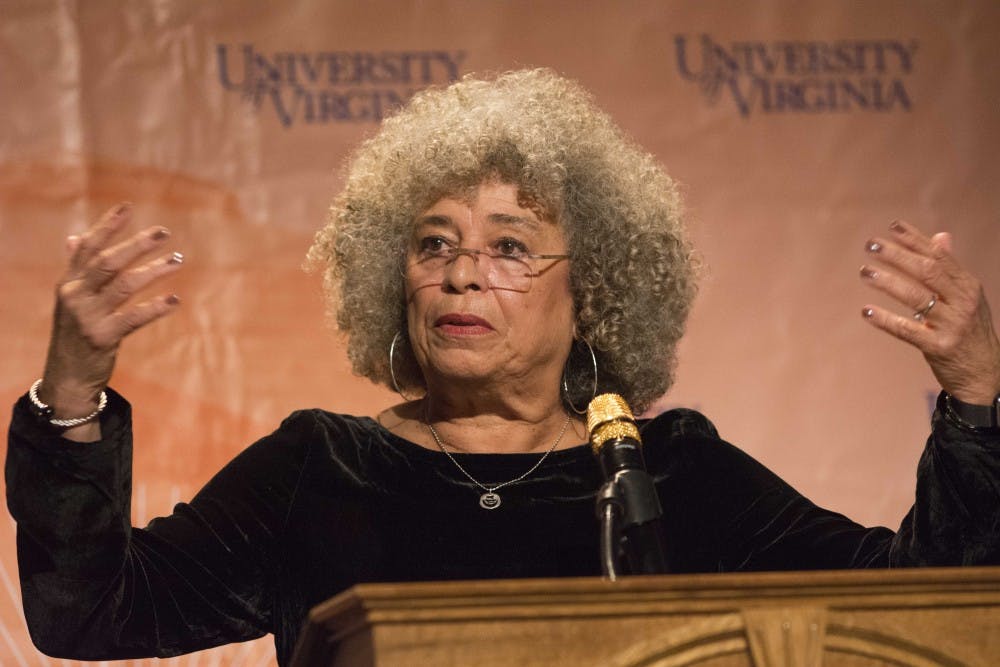Angela Davis, a women’s and civil rights activist and author of several books such as “Women, Culture and Politics,” spoke about diversity, equality and justice at the Paramount Theater in downtown Charlottesville Tuesday as a part of the ongoing Excellence Through Diversity Distinguished Learning Series hosted by the School of Engineering and Applied Science.
Attendance at the event filled the capacity of the theater, a total of 1,041 seats, and included students from Albemarle High School, the University and the Charlottesville community.
According to Thomas Pilnik, program coordinator for the Office of Diversity and Engagement, general admission tickets for the event were sold out in two minutes after they were made available Friday morning. Pilnik added that such an occurrence was unheard of for any speaker in the series thus far.
“I spoke with the Paramount recently about it, and they called it unprecedented,” Pilnik said. “And they actually haven’t seen anything like this before from a lecture, rather than a concert. That just shows the impact that Angela Davis has on the United States and also how deep this series has now affected the community.”
Davis based the majority of her talk on the activist power of women in America and the crucial role of women in various historical and ongoing civil rights struggles, such as the labor movement to advocate for fair and equal wages.
“I think it is important to acknowledge that women have always been the backbone of the labor movement, even when they were excluded from paid labor,” Davis said. “In fact, women have been the backbone of all movements.”
In addition to the role of women in social activism both past and present, Davis said they are taking a stand for civil rights and equality now more than ever before. For example, more than 500,000 protesters marched in Washington in January 2017 as part of the Women’s March advocating for women’s and civil rights.
“What’s really exciting about this period is that we are witnessing the rise of women,” Davis said. “And everybody should be happy about that. Men especially should feel overjoyed … that they can take feminist positions as well.”
Davis also addressed the relationship between diversity and justice in the United States. Davis said that diversity and justice must work hand in hand together to combat structural inequality in American society.
“Diversity without changing the structure, without calling for structural formation, simply brings those who were previously excluded into a process that continues to be as racist, as misogynist as it was before,” Davis said
After the event, guests were able to ask Davis questions on a range of issues, but many focused on potential ways to promote justice and equality in their everyday lives. Davis discussed multiple solutions, including the consistent need for organizational work such as political reform and activism.
“The real work is organizing work,” Davis said. “It’s work that often isn’t recognized … Now is the time to do that.”
Another solution Davis suggested was the recognition of connections between various social and political issues in modern America — to observe the ways in which activists advocating for different causes are united in the pursuit of equality.
In particular, Davis identified the use of marches and protests by both the “Dream Defenders” in Florida, which formed after the shooting of 17-year-old Trayvon Martin by a neighborhood watch captain and works to stop mass incarceration, and students protesting gun violence after 17 individuals were killed in a shooting last month at Marjory Stoneman Douglas High School in Parkland, Fla.
Don Gathers, a local community activist and former chair of the Charlottesville Blue Ribbon Commission on Race, Memorials and Public Spaces, said after Davis’s speech that he is excited to see this new wave of women empowerment throughout their long time struggle for equality and civil rights.
“I am excited and I am very much looking forward to it,” Gathers said. “Wherever I can fall in line, is where I can fit in. I grew up in a strong household with both mother and grandmother, and I understand the importance of women in today’s society. And realizing the role they can play … it is what’s right and so long overdue.”
First-year College student Annie Heath said one of her main takeaways were from Davis’s talk was understanding the importance of recognizing the connections between American social and political issues and the responsibility Heath said she has as a first-year to promote awareness and change.
“I think as first-years, we need to have our eyes open … and understand that we can actually implement the change as well,” Heath stated. “Like she [Davis] was saying, it’s young people who should be doing this so just understanding that you can do that [is important].”
The next and final installment of the Distinguished Learning Series will feature a conversation with former NFL player and LGBTQ actvist Michael Sam and will be hosted in McLeod Hall on April 12.
John Fitzgerald Gates, associate dean for Diversity and Inclusion at the School of Engineering and Applied Science, developed the series in 2016 in an effort to promote inclusivity and diversity at the University through various high-status speakers. Past speakers in the series have included Ana Navarro, a political strategist and CNN commentator, and Michelle Alexander, a civil rights lawyer and advocate.







